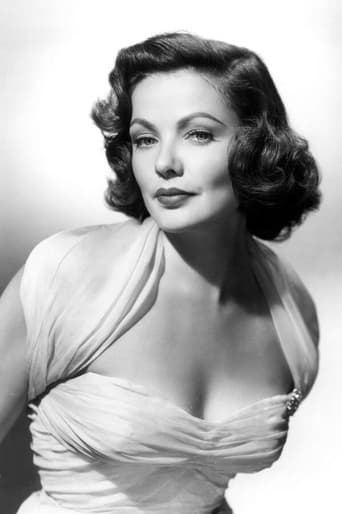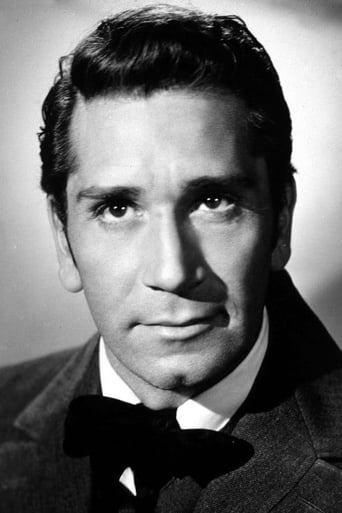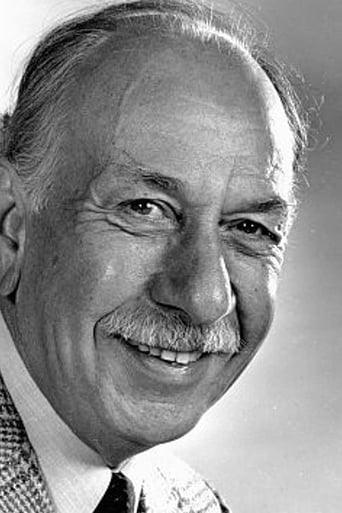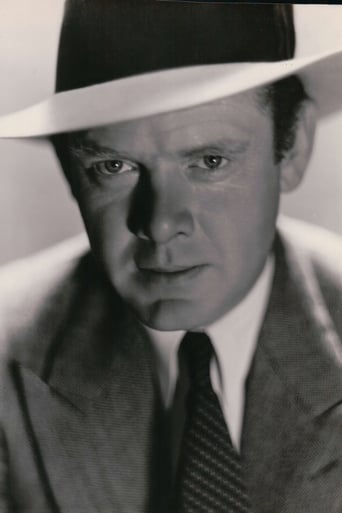Moustroll
Good movie but grossly overrated
Teringer
An Exercise In Nonsense
Connianatu
How wonderful it is to see this fine actress carry a film and carry it so beautifully.
Jakoba
True to its essence, the characters remain on the same line and manage to entertain the viewer, each highlighting their own distinctive qualities or touches.
MartinHafer
Had I not already seen "Fear in the Night" (1947), I think I would have liked "Whirlpool" a bit more. But, the prior film was low-budget and handled a similar topic much better. In contrast, Otto Preminger was a big-name director and this was made by Twentieth-Century Fox--yet lacks the same emotional wallop as "Fear in the Night". Both films are about evil hypnotists who use their powers for evil and to cover up crimes. While this is all a lot of psychological mumbo-jumbo, it was fascinating. But what made the prior film better is its originality as well as how it surprised the viewer. That's because in the Preminger film, you see the evil hypnotist (Jose Ferrer) setting up the crime, so you know exactly who is responsible--and there is absolutely no mystery about this. In contrast, the other film only slowly reveals what has occurred--thinking the viewer guessing and making for a much higher level of suspense. Still, both are worth seeing...and both are dubious when it comes to showing the ridiculous things hypnosis supposedly can do (I have training in hypnosis and know it is a lot less magical than TV and movies would have you think).Gene Tierney is caught shoplifting at the beginning of the film. Despite her husband being a well to do psychiatrist, she's a thief...and the evil hypnotist catches her and uses this to gain influence over her. While he pretends to be there to treat her for her compulsion to steal, he actually is hypnotizing her into doing his bidding--much like Svengali from the story "Trilby". Eventually, using this evil hypnosis, Tierney is caught in the home of a woman who was just murdered--and it appeared she did it. This is only about midway through the film and unraveling this bizarre mystery takes up the second half of the movie.As another reviewer said, Charles Bickford did a very good job playing the detective investigating the case. The rest of the cast was just fine, though it is interesting that they chose Tierney to play a mentally unstable woman since in real life she had a long and significant history of mental illness. This was actually pretty brave of her to play such a tough role. It's well made and interesting as well...but not at all great or extraordinary. Decent, but that's all.
Turfseer
Ann Sutton (Gene Tierney) is married to Dr. Bill Sutton, an upright psychoanalyst (played by a completely miscast Richard Conte). When we first meet Ann, she's getting arrested by a store detective in a department store after attempting to steal an expensive piece of jewelry. Okay, so that's a bit of a twist—our heroine is a kleptomaniac. Next into the mix is the oily David Korvo (nicely and seedily played by Jose Ferrer). He knows the department store owner and convinces him to drop the charges against Ann.Korvo is 1949's answer to a new age practitioner: he dabbles in astrology but is principally a hypnotist. At first Ann believes Korvo is trying to blackmail her but he persuades her that he really wants to be her 'therapist'. Ann is smart enough to realize that Korvo is trying to get her to come up to his hotel room so they can have sex so she meets him downstairs in the hotel lobby. Korvo gives up on the sex idea but has more sinister plans. At first, he charges $50 for hypnotism sessions which appear to be helping Ann with her insomnia.We learn more about Korvo from one of Bill Sutton's patients, Theresa Randolph, who tries to warn Ann that Korvo is a blackmailer and up to no good but Ann believes that Theresa is merely jealous of her relationship with this extremely crafty Svengali (apparently Bill adheres to a strict code of doctor-patient confidentiality as Ann has never met Theresa Randolph before). Bill records his therapy sessions on new-fangled long playing records which he stores in a closet in his home. Everything about Korvo's 'modus operandi' (his penchant for blackmail and physical abuse) are detailed in these recordings and Korvo realizes that he has to get his hands on them if he is to continue in his career as a con artist.So what does Korvo do? He murders Randolph (just as she's about to change her will negating a bequest that leaves Korvo a large amount of money as part of her estate). He also hypnotizes Ann and has her steal the Randolph therapy session recordings and puts them in a closet in Randolph's house. He sets Ann up by leaving a glass with Ann's fingerprint on it in Randolph's home. The police arrive and arrest Ann for murder.Now it gets strange, real strange! Korvo needs an alibi. Apparently he's been having gall bladder problems so he arranges to have an operation at two in the afternoon on the day of the murder. The murder occurs at nine in the evening so how does Korvo pull it off? Well we find out (quite improbably) that Korvo hypnotized himself and was able to drag himself out of bed and commit the murder.The hypnotist's power of suggestion has a prominent role in this film but unfortunately much too prominent. I always believed that hypnotism might be a useful tool in helping people overcome minor health or psychological problems (such as Ann being helped with her insomnia at the beginning of the film). But I didn't buy it for a minute when Korvo orders Ann around in a trance and then hypnotizes himself hours after major surgery. And then Korvo does it again—he hypnotizes himself once more so he can leave the hospital and try and get his hands on the recordings. But instead of taking the recordings and getting out of the deceased Randolph's house right away (or even destroying them at the house), he tarries and begins playing them on the phonograph in the living room. This gives the Suttons and the investigating detective enough time to arrive at the crime scene where they eventually confront Korvo, who drops dead from blood loss (apparently his hypnotic suggestions are not powerful enough to stanch the bleeding—complications from his surgery earlier that afternoon).Aside from the obvious plot holes, there is also a distasteful conceit being peddled by the film's screenwriters here. The dubious and subjective 'profession' of psychoanalysis not only is depicted as being highly 'scientific' but is also placed on par with practitioners in the medical profession. 'Unscientific', unlicensed 'healers' (represented by the evil Korvo) are presented as bogus and manipulative in striking contrast to the upright Dr. Sutton (who uses his psychobabble) to uncover the ROOT of his wife's kleptomania. With some kind soothing words, Dr. Sutton will soon solve his wife's neurosis and they can once again move amongst their social equals and bring good cheer to them without the fear of scandal.If you see this on DVD, there's some interesting commentary by film critic Richard Shickel. He notes that the late film critic, Pauline Kael, termed this film "a real stinker". But Schikel is more on the side of critic Andrew Sarris who felt there were a lot of worthwhile things about the film. While Tierney and Ferrer's performances draw you in, the plot holes and the psychobabble are enough to keep one from taking the DVD off the shelf and watching it every couple of months. I'm not sure if 'Whirlpool' deserves to be called a 'real stinker' but it's decidedly no great work of art!
Michael O'Keefe
The famed Otto Preminger produces and directs this melodrama written by Ben Hect and Andrew Solt. A much over looked piece of Film Noir from 20th Century Fox starring the alluring Gene Tierney. Although her husband 'Bill' Sutton(Richard Conte)is a well known psychologist, Ann Sutton(Tierney)is a kleptomaniac, who is trapped into being treated by an unscrupulous hypnotist David Korvo(Jose Ferrer). Korvo is notorious for making his living by taking advantage of unsuspecting women and blackmailing them. Korvo will force Mrs. Sutton's involvement in a failed relationship's payoff and murder. Dirty dealing is going on for sure. And what is a girl to do while under a spell? WHIRLPOOL also features: Charles Bickford, Barbara O'Neal and Constance Collier. With no disrespect to the beautiful Tierney, a great director like Preminger can make a not-so-flamboyant cast look good.
Spikeopath
An interesting and divisive film noir thriller directed by Otto Preminger and written by Ben Hecht (under the blacklist pseudonym Lester Barstow) and Andrew Solt. Adapted from the novel "Methinks the Lady" written by Guy Endore, the film Stars Gene Tierney, Richard Conte, José Ferrer, and Charles Bickford. Arthur C. Miller is the cinematographer and David Raksin, under the watchful eye of Alfred Newman, provides the music.The plot sees Ann Sutton (Tierney), the wife of a successful psychoanalyst (Conte), arrested for shoplifting since she has some kleptomania issues. Just when it seems Ann is about to be thrust into a world of scandal, she is saved by smooth-talking hypnotist called David Korvo (Ferrer). Korvo, however, is not what he seems to be, and Ann soon finds herself involved in blackmail and murder and her marriage on the brink of collapse. Confused and emotionally torn, Ann is unsure whether or not she has committed a crime. It looks bleak unless her husband or the police can get to the bottom of the murky mystery.Combining a psychological thriller core with overt melodramatics, Whirlpool has still to convince many of the film noir hoards as to its worth. Some critics find the concept of the story silly and hard to take, whilst others have gone a step further to suggest that Preminger and Hecht have merely remade Hitchcock's Gregory Peck starrer Spellbound (Hecht on screenplay duties there too) from four years earlier. Either way, and putting a noirish sheen on a Hitchcock movie is no bad thing by the way, Preminger's movie is a compelling little piece of cinema. The central theme of hypnosis as a weapon gives the film a dark edge and Preminger nicely portrays a world containing sympathetically flawed characters. While in the form of Ferrer's oily slick Korvo, film noir gets a most intriguing Mabuse/Freudian like villain of high entertainment value.Tierney doesn't have to do much here, asked to portray confusion and a almost constant state of hypnotism, she delivers well enough whilst always remaining innocently sexy. Conte's woodenness as the husband oddly benefits the story, while also worthy of a mention is the ever watchable Charles Bickford as Lt. Colton, a thinking man's copper, Bickford keeps it serious as the daftness of the plot threatens to submerge and unhinge the drama.Frowned upon by big hitting American critics, the film found support from notable Frenchies Rivette and Godard. It seems that like myself, they also liked the quirky and creepy nature of the beast. 7/10





